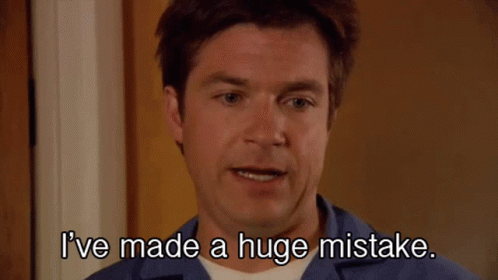|
Been a therapist for a few years. I'm registered with my state's governing body. I've become more fun at parties until people worry about you brainthinking them. I work in private practice, although I have worked in clinics in the past. Got some time and kinda bored so here we are  . Ask away! . Ask away!thehandtruck fucked around with this message at 15:33 on Sep 19, 2022 |
|
|
|

|
| # ? May 4, 2024 22:50 |
|
What do you do with folks who just need to hear some version of the Todd : Bojack Horseman speech of, 'you just have to do better'. I have a sister who goes to a therapist, but she kinda just needs someone to shake her around and tell her that her life isn't that hard, but she thinks she's always the victim of a circumstance (she isn't) -- I always wonder what her therapist says.
Canine Blues Arooo fucked around with this message at 06:10 on Sep 16, 2022 |
|
|
|
Canine Blues Arooo posted:What do you do with folks who just need to hear some version of the Todd : Bojack Horseman speech of, 'you just have to do better'. I have a sister who goes to a therapist, but she kinda just needs someone to shake her around and tell her that her life isn't that hard, but she thinks she's always the victim of a circumstance (she isn't) -- I always wonder what her therapist says. Never seen the show before but a version of what the guy says to the horse sometimes needs to be said. But, this is kind of a trope that lay people see with therapy, hoping the therapist will be the person who'll finally be the one to say, "You're Just A Professional Victim." And not to be a dick but from the rest of your post we're in that zone of you wanting your sister to change and wanting your therapist to be the one to do it, but that's not really what therapy is. As a therapist you gotta be careful too because you need to make sure when you say something like that it's not coming from a place of frustration (because that's YOUR unprocessed poo poo coming up). And you also gotta be careful because if the right -Containment- (sorry for the jargon but it's relevant I promise) isn't there, then you'll just be one more person in their life to avoid. That means the space has to be safe, they have to be able to be vulnerable and open to something so big, and there needs to be trust (and in my opinion love) between the client and therapist. In AA they say, "you're not responsible for your disease, but you are responsible for your recovery." It's important to understand that from an agency perspective. It wasn't your fault you ended up in this position, but now it's your opportunity to make changes. And, I can pretty much guarantee that she needs more than just someone to shake her around and tell her that life isn't that hard. Nobody needs that. Not a client on earth would be able to make improvements and feel safe after being dismissed like that. What she (and everyone else needs) is a space to process things that they were always told don't need to be processed. Sometimes people aren't in a place in their life when they can hear that. Sometimes they are. A supervisor I had years ago said she went to therapy for 15 years and it never helped. Finally one said, "You're just a professional victim." She stopped seeing the therapist that day and never went back. She said it was the best thing anyone ever told her. Also, that supervisor is a psycho and iirc her license has been revoked so, who loving knows.
|
|
|
|
thehandtruck posted:Been a therapist for a few years. I'm registered with my state's governing body. I've become more fun at parties until people worry about you brainthinking them. Got some time and kinda bored so here we are What do you actually do? The only frame of reference I have is TV, which basically makes it look like people are paying for a captive audience so they can ramble about whatever bullshit they feel like for an hour a week. I have to assume there's more to it than that because that seems like a complete waste of everyone's time.
|
|
|
|
Tiggum posted:What do you actually do? The only frame of reference I have is TV, which basically makes it look like people are paying for a captive audience so they can ramble about whatever bullshit they feel like for an hour a week. I have to assume there's more to it than that because that seems like a complete waste of everyone's time. There's a few ways to interpret what therapists actually do in the room but if you really dig into it it's all basically the same thing. Plenty of theories exist: Family Systems, Psychodynamic, Gestalt, Jungian, etc, but they all share a core idea of therapy which is to create a space where people can understand themselves, understand their lives, understand their childhood. I know that still doesn't tell you exactly what a therapist DOES, which is your question but a lot of the time it's more about a therapist DOESNT do that really distinguishes them from just being a friend or whatever. Think about it like this: You meet Bob at a party and he's complaining about how nobody will give him a job. He gets to the interview, his experience is good, his hard skills are there, but each interview at each job says, "hey sorry there's just something about your personality that rubs us the wrong way, we'll have to pass." As he's explaining his story to you, you, normal human Tiggum realizes "oh poo poo, this guy is really grating, he keeps cutting people off in conversations, he's a bad listener, and I just generally feel annoyed when he talks." Here is where what a therapist does diverges from what a friend or coworker or family member or stranger does. At the party you might tell him, "hey, you're annoying as gently caress." And what's Bob gonna do? He's gonna get defensive and be a pissy rear end in a top hat. And you're gonna smirk and go "heh, see!" and he's gonna walk away pissed off and nothing changes and he still doesnt land jobs. A therapist will build a connection with Bob for a long time first. Sometimes depending on the person and trauma and situation that trust-building process might take a year, sometimes a month. In the case of personality disorders, like Narcissistic PD, maybe FIVE. I'm not kidding with that number. (And most people with NPD will not go to therapy anyway, it's terrifying to them on a basic survival level and I can get into that if you like). Anyway, building this connection, so that there is a genuine trust and safety will allow the therapist to ask a question that if you had asked at the party, he would have scoffed and either not answered or not answered genuinely. The question can be something as simple as, "how old were you when you had to behave this way?" or "when did you first notice you had to interrupt people when they spoke?". And depending on your theory of choice, used to conceptualize a case, different things are happening but I don't think you're asking that. And when a therapist asks that question, they aren't faking a genuine, unconditional positive regard for that person. And the person can feel it, and it lets them feel safe to open up and explore and resolve old wounds that made them the way they are. But here is the REAL difference between a therapist and a layperson. This is what I mean when I say what a therapist DOESNT do versus what they do: Let's say the situation is a little different. You've been friends with Bob for 5 years, he's a close friend. He calls you one day to vent. He says he's not happy with his wife and wants to leave her, he wants to travel the world, be happy, he's tired of being depressed, he's not gotten to travel his entire life, his parents wouldn't let him. There's a catch though, he has an 8 year old son. He says he loves his son, but he has to do this, he just has to. He wants to live a real life. You, as a friend, want to give him good advice, but your dad left when you were 8 and it really hosed you up. So when you talk, even though you THINK you're giving being present and listening and affirming, you're not. Little bits of your pain and trauma from that same abandonment are coming out. If you were a therapist we'd call this Counter-Transference because your unprocessed poo poo is being transferred onto this person. Therapist go to therapy for years and should be in therapy so that they can process their poo poo and make sure they don't transfer it onto their clients. And I know you weren't saying this but everyone says, "hey I can just sit and listen to someone for an hour for 200 bucks," but I loving guarantee you, it's VERY difficult to just sit and shut the gently caress up for an hour. Try it next time a friend calls complaining and asking for advice. And that's the thing, the act of sitting, listening, being present, shutting the gently caress up but being totally focused on your client, that is an act of love. For many people, they NEVER had that as a child. Their feelings were thrown away or disregarded. So just having someone listen and NOT pull their poo poo into the conversation (like parents oftentimes do) is literally, scientifically, empirically shown to be healing. And I didn't even start to get into trauma therapy, which is where the therapist is very active in helping a client to process trauma so it stops controlling their life. Like with PTSD and such. I'm sorry it wasn't the most direct answer but it's a nebulous profession. Sounds corny but you can "feel" the answer to your question when you talk to an experienced therapist in a room versus a friend or mom or stranger.
|
|
|
|
But what do you do though? Like, someone shows up in your office (or whatever your place of business) for the first time, what actually happens? Do people have to have a specific problem to come see you (like they would with a medical doctor)? If so, how do they know what that even is? I go to a GP, it's because something hurts, itches, looks weird, isn't working, etc. I tell them the problem and they look at it or poke it with a stick or whatever and give me a prescription or some advice. And if that doesn't work or it's an ongoing problem they want to check back in on, I come back another time for that. What's the equivalent process for a therapist? What do you do?
|
|
|
|
1) Someone gets my number from either a website, a word of mouth referral from an existing client, or another therapist. They call me or email me. 2) I call them back. I say "hi do u have time to talk for 15 or minutes so i can get an understanding of what's going on?" They say yes and we do 3) Some people are more open about a problem they're currently dealing with, some are vague. if they're too vague I'll say, what brings you to therapy, or why did you call me? This gives me more info. I work with 95% of people, so it's usually on them to decide if they at the end of the call if they want to work with me. And I will ask them if they do. Sometimes they want to think about it for a while, and I say that's fine lmk and good luck. We talk about fee. If I detect they have a personality disorder I usually refer them to someone else, unless my schedule allows it. 4) If they want to work with me I email them informed consent forms and other legal documents like that. If I detect some sexual abuse, boundary crossing, etc I include documents such as the pamphlet Therapy Never Includes Sex. They fill out the forms, we talk about a time to meet, and we meet. 5) Sometimes yes they have a specific problem they're dealing with, sometimes they just feel like they need to talk to someone who isn't going to tell them to suck it the gently caress up, or to stop being gay, or to stop being sad. If you're asking about a specialization for me, yes I specialize in a few areas and that will generate a lot of how people are referred to me. I help them explore why they came to see me, what the problem is, etc. 6) Then we talk. You know, like, having an actual conversation with a human. Like, "how are you?" "What kind of things do you like to do?" We like, get to know each other, like humans, talking. To each other. Weekly. That's what I do, I listen and I talk. Give my undivided attention for an hour. While we talk I am mentally assessing for things. I tailor the things I say and ask based on those mental assessments in tandem with how I feel. I do alllllllllll of this under the containment of unconditional positive regard. At the end of the session I say, "okay, see you next week." 7) They leave the office or I close the zoom call and I charge their credit card through a hipaa compliant app. I takes notes on the session. For your scenario, I don't know if there's an equivalent process because its not an equivalent job. Most people go to their GP and say "doc I rawdogged and now it burns when I pee" and he gives you a medication. There's no quick fixes in therapy. I'm trying to answer your question but it's complicated. The prescription IS the therapy. It would be analogous to say that talking to your gp about how it burns when you pee made it not burn when you pee. It's not like a client goes to therapy and I usually say "ok I am now a brain expert of you, here's how to fix your life". A bad analogy to your question would be going to see your GP IS the prescribed healing cure. Freud called therapy the talking cure. What do I DO? I provide a space where people can DO therapy. They do it. I don't DO "much". They have to do the work and heal. Does that answer your question? edit: advice rarely works in the way people want it to. so I don't usually do it. if people come in wanting my advice (happens a lot) I will usually say the cliche annoying therapist trope thing of "why's it so important for me to tell you what to do?". they'll say, "well I never had anyone to give me advice growing up, my parents died when I was young" and ill say "wow, what was that like?" and they'll start crying talking about how much it hurt, and magically through the power of love and neuroscience, it hurts less. thehandtruck fucked around with this message at 15:38 on Sep 19, 2022 |
|
|
|
thehandtruck posted:Does that answer your question? 
|
|
|
|
Tiggum posted:Not at all. Lol okay. Maybe 3rd times a charm: Me sit chair. SadMan sit couch. Me listen SadMan's problem. SadMan now HappyMan. How work?
|
|
|
|
How about starting here:thehandtruck posted:1) Someone gets my number from either a website, a word of mouth referral from an existing client, or another therapist. They call me or email me.
|
|
|
|
This thread came at the perfect time as I've been considering going back to school for a degree to become a therapist. What made you want to become a therapist? Was it something that you've always wanted to do or did it become something that interested you later in life? Tiggum posted:How about starting here: I don't mean to step on thehandtruck's toes (and feel free to correct me if I'm wrong!), but this article from Psychiatry.org basically lays out what a therapist does: https://psychiatry.org/patients-families/psychotherapy. How and why a person chooses to go to one will vary depending on the person, but a therapist helps their patient learn how to cope with emotional and mental problems that are impacting their life. Personally, I've been seeing a therapist due to some anxiety issues that they've helped me work through and learn how to deal with better when they pop up.
|
|
|
|
Chip McFuck posted:I don't mean to step on thehandtruck's toes (and feel free to correct me if I'm wrong!), but this article from Psychiatry.org basically lays out what a therapist does: https://psychiatry.org/patients-families/psychotherapy. Chip McFuck posted:How and why a person chooses to go to one will vary depending on the person, but a therapist helps their patient learn how to cope with emotional and mental problems that are impacting their life. Personally, I've been seeing a therapist due to some anxiety issues that they've helped me work through and learn how to deal with better when they pop up.
|
|
|
|
dog have u ever heard of sad people
|
|
|
|
Tiggum posted:This is exactly the same kind of vague non-answer as already posted. It skips straight over the key question. It mentions "symptoms" but doesn't say what they are. It talks about how to find a therapist if you've already decided that you need to see one, but not how you'd come to that decision in the first place. It doesn't say what a therapist is actually for. What they do. Well, it's vague because it's difficult to really pin down why a person will seek therapy as it will differ from person to person. Emotional and mental issues manifest themselves as symptoms in different ways depending on the person's background, experiences, personal outlook, etc. In my case, I have always had a low level of anxiety throughout my life but moving to a new city caused it to skyrocket. Where I was once outgoing and willing to hang out with friends, I became much more of a recluse and didn't want to leave my apartment. It got to the point where I was nervous to even walk to the grocery store and so depressed that I had trouble even getting up in the morning. At the time, this change seemed completely normal to me until I realized how unhappy I was with my life and what it had become. So, I sought out a professional to help me learn how to mitigate my anxiety and depression. They helped me cope with my situation and alleviate the problems I was having.
|
|
|
|
Let me directly answer you questions and then I'll tell you why I went to a therapist for a couple years. Tiggum posted:So how did you come to the conclusion that you should see a therapist? quote:How did you reach the understanding that you had a problem they could help with? quote:How did you decide something is a symptom as opposed to, I don't know, just a fact, I guess? How do you identify the problems for which a therapist can supply solutions? I decided to see a therapist after my little brother overdosed on opioids and died about 6 years ago. I had a hosed up childhood, but didn't really realize how hosed up it was because when you don't know any different it seems normal to you. His death was really the catalyst that made me seek someone out. I probably should have seen a therapist way before that to work through my poo poo but that was the triggering event for me. I found a great therapist and I went for about 2 years and it really helped me process a lot of poo poo, work things out mentally, and put me in a healthier mental place. The hard part for me was finding a therapist that wasn't going to use religion as the answer for everything as I am not religious at all. There are a ton of faith based therapist in my area, so I felt lucky to find this crunchy buddhist hippie lady who helped me out immensely. Here's an example of something we dealt with in therapy that helped me out quite a bit. My biological mom left when I was about 8 years old. My Dad was not a great guy in retrospect. Vietnam Era Vet, bad PTSD, drinking problem, abusive, etc. He was my Dad though, and for years, I like most young boys, put him on a bit of a pedestal. I couldn't understand how a mother could leave her children. I would crawl the circumference of the earth over broken glass to see my own kids for 5 minutes. I couldn't imagine not seeing my kids. She tried to get custody of us in the courts, and I'll skip a bunch of poo poo, but about the age of 10 she signed away her custodial rights. I just couldn't comprehend why someone would give up their kids like that, and I was holding onto a fair bit of anger and resentment about that, especially after I had my own kids. Through the course of therapy though, I was able to put myself in her shoes a bit, reflect on her circumstances. A woman with no resources, a high school education, no money, married to an abusive man who most likely threatened to kill her if she "took his boys away", fought in the court system for a couple years for her kids and eventually was probably forced to give up. It is very conceivable my Dad would have killed her, and possibly my brother and I if he didn't get custody of us. He was capable of doing it. It doesn't change the facts of what happened to me, but I can begin to understand the insane poo poo she probably went through and let go of the anger inside me about it. My dad's mental state declined and it got to the point where he couldn't take care of us anymore when I was 12, almost 13 years old. The PTSD, the booze, it all caught up and he had a mental break, ended up in jail. I ended up in foster care and as a ward of the state, I bounced through some group homes and a foster home for about 7 months until a family friend petitioned the court for custody of my brother and I and we joined their family. Long story short that wasn't all that great in retrospect either, and I remember the biggest loving gut punch of all my therapy sessions. I made a comment about how living with them was better than being in foster care and my therapist says "Was it though, can you really say it was better living with them than being in foster care?" and I couldn't honestly answer yes. It was like someone knocked the air out of my lungs while I tried to process that I went from one hosed up situation to another. I can go on and on about all the poo poo that happened to me, and the stuff we worked through in therapy, but it really boils down to having a independent, trained 3rd party there to listen to you, help you work through things, maybe offer some observations or help you consider other things going on, and help you get to a better place mentally. skipdogg fucked around with this message at 18:19 on Sep 19, 2022 |
|
|
|
Tiggum posted:Not at all. You were actually right in your first post. Therapy is only for selfish people that want to pay for attention. It's basically for rich entitled babies. There is no possible other explanation, and the multiple posts the OP has made that directly address your question are utterly incomprehensible. E: I'm being sarcastic. You have actual literal autism tiggum Jorge Bell fucked around with this message at 23:42 on Sep 19, 2022 |
|
|
|
Chip McFuck posted:This thread came at the perfect time as I've been considering going back to school for a degree to become a therapist. Ah very cool. Well I tried a few professions and they weren't really challenging to me. I even looked into the traditionally "smart" jobs and it just wasn't feeling it. I had worked in a related field and found the most enjoyable (and difficult) parts of that job were the parts that had similarities to therapy. Then I did a regular person job for a while and one night I woke up and thought, "ohhhh ok I want to become a therapist" so I looked at schools and got into one that was fine and started a few months later. But yeah I mean, I've always been interested in people. Starting out, this job feels like a high, I mean you do kind of get high if you have an addiction to intensity like myself. Every moment of your job is different from the last, each moment matters, you have to be extremely focused, present, responsive, engaged all the time, and there is a ton intensity. I did have a professor who asked us that question you did, "What made you want to become a therapist?" But his question was worded a little differently. "What happened in your life, or what was your role in your family system that YOU had to be the one who became the therapist?" And that's a very pertinent question all the time, and definitely something to reflect on if you do become one. I'll just be honest, in my experience therapists are the most hosed up people, and the ones who had the most hosed up lives and worked through it are the BEST therapists. Not saying I'm in that category of Best but there's definitely a reason I became one. Good luck! thehandtruck fucked around with this message at 22:11 on Sep 19, 2022 |
|
|
|
Chip McFuck posted:At the time, this change seemed completely normal to me until I realized how unhappy I was with my life and what it had become. So, I sought out a professional to help me learn how to mitigate my anxiety and depression. They helped me cope with my situation and alleviate the problems I was having. B) How did they do that? (How did you know it was working?) skipdogg posted:2) My Psychiatrist that handles my ADHD recommended I see a therapist to work through my poo poo. So if a doctor just happened to notice that I had some issue that a therapist could help with, then I guess they'd refer me. But on my own I don't know what that issue could be and if I have such an issue I wouldn't independently bring it up to a GP because I don't know to do so. And I don't know (and it seems like maybe you don't either) exactly what prompted your doctor to refer you. Which is the thing I'm interested in. Jorge Bell posted:You were actually right in your first post. Therapy is only for selfish people that want to pay for attention. It's basically for rich entitled babies. There is no possible other explanation, and the multiple posts the OP has made that directly address your question are utterly incomprehensible.
|
|
|
|
Tiggum posted:I'm coming at this with the assumption that there is something there I'm not seeing or aware of. I just want someone to tell me what it is. I'm going to talk to you like you are a child because you're ignoring the actual therapist telling you what therapy is: People seek the services of a mental health professional, like a therapist or psychologist/psychiatrist, when they are feeling mentally unwell. This can either be a deviation from what they feel is a healthy baseline, or a longstanding issue they'd like to address. These issues or deviations can take the form of intrusive thoughts, persistent unwelcome moods, mood changes, or unwanted internal reactions to things, among other issues. For example, a person may seek therapy if they find themselves habitually cheating in relationships. Since this is a behavior they control, but can't seem to resist, a therapist might be able to help them work through why they keep cheating despite knowing it hurts their partner. It takes therapy to address a lot of mental health issues since everyone's circumstances and thoughts are different. Sometimes simply being listened to in a room can help. Simply being told "don't cheat" isn't enough, because the reasons people do things are more complicated than that. There is no more specific answer because all therapists operate differently. There isn't a single script they follow. thehandtruck posted a fairly comprehensive guide to how they start sessions with a new client. Jorge Bell fucked around with this message at 06:24 on Sep 20, 2022 |
|
|
|
Assuming I'm reading this correctly, what did it take for you to work through the bullshit of your life to get to the point of being a good therapist? Was there an indication that made you think you were ready to do this kind of work? Also what degree(s) did you end up pursuing? Knowing all of this, is there another educational path you would have taken? Also, thanks for the thread. I've been curious about some of this stuff.
|
|
|
|
Tiggum posted:I don't know (and it seems like maybe you don't either) exactly what prompted your doctor to refer you. Which is the thing I'm interested in. See this is what makes me think you're posting in bad faith, either you didn't read my entire post, or you don't understand how what happened led to me going to therapy. I feel like it was pretty clear in my post what prompted my doctor to refer me to a therapist. My little brother died from a drug overdose and it brought back a whole bunch of feelings, anger, resentment and other unhealthy mental feelings from my childhood. My mother abandoning me at the age of 10. My father having a psychotic break when I was 12 and spending months in foster care and becoming a ward of the state. I'm not sure how you can't see the connection of a traumatic event like my little brother dying triggering all these feelings coming back and how my Psychiatrist would recommend me talk to a therapist to try to work through these things. My Psychiatrist specializes in the management of ADHD, she's not really the right resource to provide therapy, nor would she be cost effective to provide therapy. Just like a GP outsourcing an MRI or sending a referral to a Cardiologist, my Psychiatrist referred me a therapist. You seem to be looking for some kind of flow chart like we're some sort of machine or logic system. If A goto B. We humans generally don't work like that. If you want me to break it down like that for you though here you go Little brother died of drug overdose > flood of repressed feelings about hosed up childhood issues come back to my brain > talk to ADHD Psychologist about it > Psychologist says talk to therapist to deal with flood of repressed feelings >> Skippy goes to therapy for a couple years and gets brain in better place and deals with bad feelings.
|
|
|
|
Uganda Loves Me posted:Assuming I'm reading this correctly, what did it take for you to work through the bullshit of your life to get to the point of being a good therapist? Ha! I don't know if I'd label myself as a Good Therapist. I'm good when I'm good and lacking when I'm lacking. But more to your question, my own therapy. For me that's continual and often. I'm in process groups, support groups, individual, etc. Not just because I need it (and I do!), but because it makes me happier and stronger. If I quit this job for any amount of time or permanently I'll still do those because it's for me. In terms of working through my own stuff, that's an ongoing process. The clients will bring you to edges of yourself that you need to grow. And you might not even know you're not whole in those places until a client brings you there. Then, if you're a good therapist, you bring it up in therapy, case consultation groups, with friends who are also colleagues, and you process it. That's why some of the big boys in the field refer to it as a gift, because it helps you grow as a person yourself. But a "good" therapist, one I'd consider seeing for example, has no less than 10 years of experience. Anything under that and A) there's just too little of yourself that has grown, and B) you just don't have the experience. I myself am under 10 years, and I think I'm decent, but that's why I say I'm good when I'm good and lacking when I'm lacking. Uganda Loves Me posted:Was there an indication that made you think you were ready to do this kind of work? I don't know if there's a single point where you go "ok Im ready". None of us were ready in school/practicum. In an ideal world with more oversight into training in this profession, I would say a therapist is "ready" when they're able to love their client. Without the love, what the gently caress are you doing here? Why go through all this misery? IMO those people end up doing a lot of CBT, overfilling their schedule, doing awful therapy, and end up with some kind of board reprimand for breaking big or small rules. Maybe more concretely, when they can sit across from someone and not give advice or suggestions. "Have you tried this? Have you tried that? I think you should..." That is definitely necessary sometimes but 9 outa 10 times it's the mark of someone who is uncomfortable with their client's pain and want to run away from it. Uganda Loves Me posted:Also what degree(s) did you end up pursuing? Knowing all of this, is there another educational path you would have taken? I have a few degrees but the relevant one here is MA in Clinical Psych with a specialization in marital and family therapy. No not really, but I would have picked a cheaper school, the cheapest I could find. Mine was expensive and lovely. I learned next to nothing I use in the room, and for practicum the cheap schools and expensive schools use the same pool of clinics, so it doesnt matter. Clients don't give a gently caress either and have never asked, noted, or been curious about where I went to school and would have no frame of reference for which are "better" or worse anyway. Nearly every school in America is a joke right now, I think they should remove 90% of the coursework and replace that time with the student's own individual and group therapy. thehandtruck fucked around with this message at 17:55 on Sep 20, 2022 |
|
|
|
Ok, on the offchance that tiggum isn't acting in bad faith, I have some specifics to contribute (if that's ok -- not a therapist, but I've been in therapy a long time). 1) post traumatic stress disorder. A person goes to war, then comes home, and finds themselves behaving differently. Why? Because trauma can rewire the brain -- can make your flight-or-fight response hypersensitive. So now your brain thinks even minor stressors are a literal matter of life and death. It's not just soldiers; this can happen to anyone who survives a traumatic event. Domestic abuse, sexual assault, a violent incident. Not everyone gets this response, but some do. The solution is to literally change your thinking patterns, to walk through correcting those old loops until you form and reinforce new pathways. 2) look up Cognitive Behavioral Therapy. Sometimes people with depression or anxiety have negative thought patterns -- I saw Mary in the hallway, I said hi, she didn't say hi back = Mary secretly hates me = I bet it's because I'm a terrible person. CBT helps patients to identify where their thoughts derail. Is it possible Mary didn't see you? Is it possible Mary was busy and distracted? Is it possible Mary is having a bad day unrelated to you? Even if Mary disliked you, would that really imply you were a terrible person? What evidence do you have for any of these beliefs? 3) for a lot of my childhood, I went through something called invalidation: - you're not REALLY upset about that - you can't possibly be hurt by that - I think you're pretending to be sad for attention - no one else would care about something this stupid - you're over sensitive / a drama queen This sounds minor when you think of it happening once or twice, but when it's constant and directed at a child, the overall result is that the kid stops being able to identify their own emotions and/or know if their emotions are "appropriate". So when I'm angry, I go through this whole nightmare of second guessing myself: "would a normal person be angry at this? How angry? Am I overreacting? Maybe this doesn't matter and I shouldn't be angry at all. But I feel angry." Sometimes my therapist exists just to tell me what "normal" is. And any therapist can tell you that feelings can't be "wrong," they just are, but on top of that I need help identifying when I'm reacting strongly because of a past pain vs. when this action itself is what bothers me.
|
|
|
|
Anecdotally: I went to therapy for anxiety. After a few sessions, the therapist basically said, 'sucks to be you. There is no magical way to fix this, but here are some strategies to deal with this..' This was very useful to hear. It's hard to know what the limits of this is without trying and I do still use some of those strategies today.
|
|
|
|
have you met many bad therapists? (or, in your opinion, less-than-competent therapists?) what are they like as people? some of the stories i've heard about terrible therapist behaviour make me wonder why the hell they chose that career path in the first place, as they clearly have no regard for other people or insight into basic human behaviour
|
|
|
|
|
skipdogg posted:or you don't understand how what happened led to me going to therapy.
|
|
|
|
Tiggum posted:Correct. That is exactly the question I'm asking. Except apparently not in a way that anyone can actually understand because the answers I'm getting do not fit the question I'm trying to ask. And I don't know how to ask it any differently or more simply or directly. I apparently cannot make anyone understand what I'm trying to find out so I'm not getting an answer. Jorge Bell posted:People seek the services of a mental health professional, like a therapist or psychologist/psychiatrist, when they are feeling mentally unwell. This can either be a deviation from what they feel is a healthy baseline, or a longstanding issue they'd like to address. These issues or deviations can take the form of intrusive thoughts, persistent unwelcome moods, mood changes, or unwanted internal reactions to things, among other issues. Do you have any sense of your own thoughts? Are you aware of feeling good or bad in any sense? Most people have these feelings.
|
|
|
|
Sometimes in life you run into issues. Some of these issues seem to originate in your brain. The issues bother you and/or people around you. Everyone in e/n posts  at you. You've heard of other people who've gone to therapy. It can often be a last resort after you've tried everything and haven't been able to fix it yourself. So you decide to give therapy a shot. at you. You've heard of other people who've gone to therapy. It can often be a last resort after you've tried everything and haven't been able to fix it yourself. So you decide to give therapy a shot.
|
|
|
|
an egg posted:have you met many bad therapists? (or, in your opinion, less-than-competent therapists?) what are they like as people? some of the stories i've heard about terrible therapist behaviour make me wonder why the hell they chose that career path in the first place, as they clearly have no regard for other people or insight into basic human behaviour Many! For "what are they like as people" it's a little hard to describe. "Good" therapists pick up on it almost instantly. There's a couple things I can say though: good therapists tend to be warm, funny, and present. very very present. You feel their presence even when they're not talking, but they're also not intimidating. Their presence is warm and inviting, but they don't make you feel like a million bucks in the same way a narcissist does. Bad therapists are the opposite. You feel distant from them, surface level, and you just simply don't feel their warmth. Which makes sense that they tend to favor CBT more than "good" therapists. On a more professional level, bad therapists cross boundaries instead of upholding them. They recommend things to you more often than they listen to you, they want you to think a certain way. They tell you their opinions about things too much, they share their politics when it's inappropriate (sometimes it is!). Their countertransference comes up way too much but ultimately it comes down them not connecting with you. You should LOVE your therapist. I really mean that, they are a stand-in for the parent you never had and the love you never received when your pain was ignored as a child. A bad therapist feels distant, like going to the doctor. They don't really push you but simultaneously you don't feel supported by them. Some bad therapists are simply bad, some therapists are actively dangerous. They exist, they are licensed, they have thriving practices, and they should be in jail. They use their power to pray on people and capitalize on one of the strongest power dynamics humans can be in. I understand your question, but really I don't know how I'd give danger signs to look out for. I don't believe it will get better in the next few decades because it would require an overall of the entire MH system, which lol. Bad therapists use CBT, dangerous therapists cross boundaries. People with sexual trauma and people with borderline personality disorder are the ones that get preyed on the most imo. Your average person is a lot less likely to experience the really heinous stuff. They chose the career path with the specific intent to prey on people to fulfil their broken poo poo. Scary stuff. IMO psychiatrists are even scarier. They have even less oversight, more power, less reprimand, zero countertransference training, less psychodynamic training in general etc. MD's are nearly untouchable. And I know you didn't ask but to expand a little bit this is why I am really careful who I refer clients (or prospective clients when I'm full) to. Therapists aren't cliquish but they like their circles of friends and colleagues. I almost never refer outside of my circle because I know these people are good (great!) and safe. I only refer outside of that circle when somebody need an uncommon specialty that we don't have. I'm always on the lookout for people who work with niche things like rounding out the RPG crew! Sometimes I'll do an intake call and think "oh this person would connect really well with Bob", just on personality alone, even if it's a run of the mill thing the client is looking for.
|
|
|
|
I think that's a great breakdown of the difference between a good therapist and a bad therapist. I've gone through a number of them, and only 2 seem to really fit the bill as "good" therapists by this metric. One was part of an intensive outpatient CBT program, and I realized later on that she wasn't actually bothering with the CBT  She was leaving that organization, and I hope she went to a better environment. She was leaving that organization, and I hope she went to a better environment.
|
|
|
|
Tiggum posted:Correct. That is exactly the question I'm asking. Except apparently not in a way that anyone can actually understand because the answers I'm getting do not fit the question I'm trying to ask. And I don't know how to ask it any differently or more simply or directly. I apparently cannot make anyone understand what I'm trying to find out so I'm not getting an answer. It's really interesting to me how your position here is that nobody understands you, instead of that you understand nobody. Have you considered that possibility? (genuinely I'd like to hear your answer to that) If you DO consider that possibility, that it's you who doesn't understand us, that returns the agency back to you. It's now your chance to work on understanding what we're saying. But the way you posed it is that "nobody understands me" and therefore your work is done. Where people place agency is fascinating. Maybe you don't like the idea that it's your thinking or comprehension that needs to change, maybe it's easier to throw up your hands and say NOBODY UNDERSTANDS ME. And to be honest that makes sense to me because people try to meet you WAY more than halfway, with exhaustive and detail oriented posts. Whereas you don't meet anyone even halfway, your posts are short and obtuse and rarely include any words, phrases, ideas from anyone else's post.
|
|
|
|
didnt expect the thread to turn into this https://www.youtube.com/watch?v=PZbqAMEwtOE
|
|
|
|
thehandtruck posted:It's really interesting to me how your position here is that nobody understands you, instead of that you understand nobody. Have you considered that possibility? (genuinely I'd like to hear your answer to that) thehandtruck posted:If you DO consider that possibility, that it's you who doesn't understand us, that returns the agency back to you. It's now your chance to work on understanding what we're saying. But the way you posed it is that "nobody understands me" and therefore your work is done. Seems to me that the opposite of what you're saying is true. If you don't understand me, that's because I have failed to communicate effectively. If I don't understand you, that means you are the one who has failed to communicate. If you know the information I want and you are expressing it, but in a way I don't understand, I don't see what I can possibly do about that? Only you have the ability to change the way you're communicating. But if it's you who doesn't understand me, I'm asking the question wrong. You can only answer the question as you understand it. If I ask "what colour is a banana?" and you say "Yellow" but what I actually wanted to know was what shape it is, that's on me. Right? So if I ask a question and you give an answer and I say "no, that's not what I wanted to know" then it's up to me to find a way to ask the question so that you do understand what I want. Because you can't read my mind. thehandtruck posted:Where people place agency is fascinating. Maybe you don't like the idea that it's your thinking or comprehension that needs to change, maybe it's easier to throw up your hands and say NOBODY UNDERSTANDS ME. And to be honest that makes sense to me because people try to meet you WAY more than halfway, with exhaustive and detail oriented posts. Whereas you don't meet anyone even halfway, your posts are short and obtuse and rarely include any words, phrases, ideas from anyone else's post.
|
|
|
|

thehandtruck fucked around with this message at 06:32 on Sep 22, 2022 |
|
|
|
Tiggum posted:So if I ask a question and you give an answer and I say "no, that's not what I wanted to know" then it's up to me to find a way to ask the question so that you do understand what I want. Because you can't read my mind. Ding! Tiggum posted:I try to be as clear and concise as I can because I don't want to waste your time. I'm placing the blame for the communication failure on myself to be polite - I don't have any way of knowing which of us is actually failing to communicate clearly. And I'm not sure exactly what you mean by "obtuse". I think either you're calling me stupid, or you think I'm pretending to be stupid? Dong...
|
|
|
|
I noticed you mention CBT several times as something you associate with "bad" therapists. Can you elaborate on that at all? I've been out of therapy for a while and have been considering finding a new therapist, so I'm curious about some of the introductory process you discuss. Are there any particular questions you think it's valuable for a client to ask during the introductory meeting, as a way to gauge whether it might be a good fit? What do you want clients to ask you about?
|
|
|
|
Other shrink here, lcsw-c. You mind others chiming in, OP?
|
|
|
|
Chili posted:Other shrink here, lcsw-c. You mind others chiming in, OP? Please do!! Antivehicular posted:I noticed you mention CBT several times as something you associate with "bad" therapists. Can you elaborate on that at all? This is a huge topic. I'll try to layout a few points but I've posted a ton about it in the cspam MH thread. I couldn't figure out just now how to search my posts in that thread but with the keyboard "CBT" but there are pages of my thoughts there. 1) CBT is not systemic. It does not take into account the person's cultural system, economic system, social system, and even the interplaying systems of the mind. It works on the most outer layer of the human brain, the cognition and behaviors. Those things arise out of the the more inner core of the mind, which CBT does not attempt to touch. This is by the creator's and practitioners own admission. 2) CBT assumes certain thoughts and behaviors are wrong. A therapist arrives to the room with their own understanding that certain thoughts and behaviors are wrong. This is incredibly dangerous for obvious reasons; in this instance a therapist is God. There was a time when being gay was understood to be a disorder in the MH world. CBT did a fabulous of getting people to commit suicide because clients just couldn't stop having gay thoughts. The client's thought process was: OK I'll try to not have thoughts, that's not working, therefore something's broken in me. Even on a less drastic level contemporarily, CBT is comically ill equipped for almost everything. Remember, the by the book example of CBT is "you've had this thought or behavior 5 times a week, let's lower it to 3". If you're sad, just be less sad. If you're sad because you're not exercising, just exercise. OK well you still can't exercise? Uh I'm all out of ideas maybe time to admit yourself lol. What if someone comes in and says their mom just died. What about grieving? Healing? Nope, not with CBT. "Client will attempt to stop thinking about their dead mom from 5x a week to 3x." What if a CBT practitioner NOW thinks certain things are axiomatically Wrong, like being a communist? Being a liberal? Being a chud? Etc. It's a scary road and not science fiction, it literally happened less than 2 decades ago and it hurt people. CBT is used TODAY in gay conversation torture therapy all over America. 3) CBT does not work. You can look at it's own wiki and the studies it talks about. They're hilarious. In one of them they had a control group where CBT therapists had to go by the Beck CBT book, in another group the CBT therapists didn't have the book and could do/say what they feel is needed. The control group's clients reported feeling worse after weeks of therapy. What was the other group's therapists doing when they deviated from CBT? They were doing other modalities lol. 4) It is preferred by insurance because it provides an end date and other evil insurancy reasons. 5) It is preferred by bad or weak therapists because you can hold up a paper with a flow chart and if the client isn't feeling better you just blame it on them. And of course a literal robot can do it, there's truly no need for a CBT therapist because you follow a protocol. 6) It is equivalent to self help gurus and other nonsense. There is no inner work because there is no inner human. Your job on this earth is fill your day with work and if you can't do that you're broken. It's a dystopian and evil way to treat a person. It should be outlawed and in some countries in Europe it is. I think it will be outlawed in America at some point as well. I don't have a single friend or colleague in my circle or even expanded referral network that does CBT, at all. I would NEVER refer a client to someone who did. Tangentially, I don't even like the people who do CBT. They're not funny or interesting, and they're not warm and loving. Sometimes green therapists start with this and grow out of it. If a client claims it worked for them, either their problem was alleviated for a short amount of time and then came back with a vengeance (incredibly common and empirically proven), OR the therapist wasn't actually doing CBT. Antivehicular posted:I've been out of therapy for a while and have been considering finding a new therapist, so I'm curious about some of the introductory process you discuss. Are there any particular questions you think it's valuable for a client to ask during the introductory meeting, as a way to gauge whether it might be a good fit? What do you want clients to ask you about? I don't know if there are must asks. When I was looking for an individual therapist a few years ago I flatly asked about their thoughts on capitalism. That's important to me because it shows the therapist takes into account the greater systems that impact our lives. I think the most important thing is you feel like a connection between you two could grow. I'm trying to think of questions people asked me but not many are coming to mind. Mostly they tell me what's going on, I ask a few questions that both give me more information and show that I really see them, and that's usually enough for them to feel a connection. I think just ask about their style, how they like to work, you could ask them what music they like, whatever. If they're super closed off and distant, might not be a good fit. Just reflect on how you feel after the consultation call. Always shop around too.
|
|
|
|
I'll throw in a dumb question that torments me and has caused me to quit half a dozen therapists by now How do you (a patient) choose to want to get better? I'm miserable inside all the time, but I can't get myself to agree that an alternative is possible. 'It's only going to get worse from here' is my default and I can't seem to will a change to happen
|
|
|
|

|
| # ? May 4, 2024 22:50 |
|
What countries have outlawed CBT? I did some searching and couldn't find anything about that -- just bans on forms of conversion therapy or similar treatments for autistic patients, which are good bans but aren't CBT. I'm intrigued by this because my experience with it was nothing like what you described. It's possible the therapist who used it with me wasn't using the actual program, but it certainly wasn't saying that any thoughts were inherently wrong or suggesting that I try to think certain thoughts less often. In my case it was entirely a way to stop and reframe black and white catastrophic thinking by applying logic and evidence to your unspoken beliefs. E.g. if a person says "I failed this test, my parents are going to hate me, no wonder, I'm worthless and I'm really stupid" -- you stop and break down what actually happened vs what's just spiraling. What actually happened: I failed a test. Belief: I'm stupid and worthless. And then you process "wait, that doesn't mean I'm stupid, that means I didn't understand this material. Maybe I should have asked for help with it, but if so, that means I made a mistake -- that doesn't make me stupid. Maybe I can ask for help now." Or similarly, turning "my parents will hate me" into "my parents will be disappointed, and so am I. I will ask them to help me get support with this material." Essentially, take a deep breath, really think through the beliefs coloring your feelings, and see if they're legit. Are you saying that's not what CBT is?
|
|
|




















 i like nice words
i like nice words




